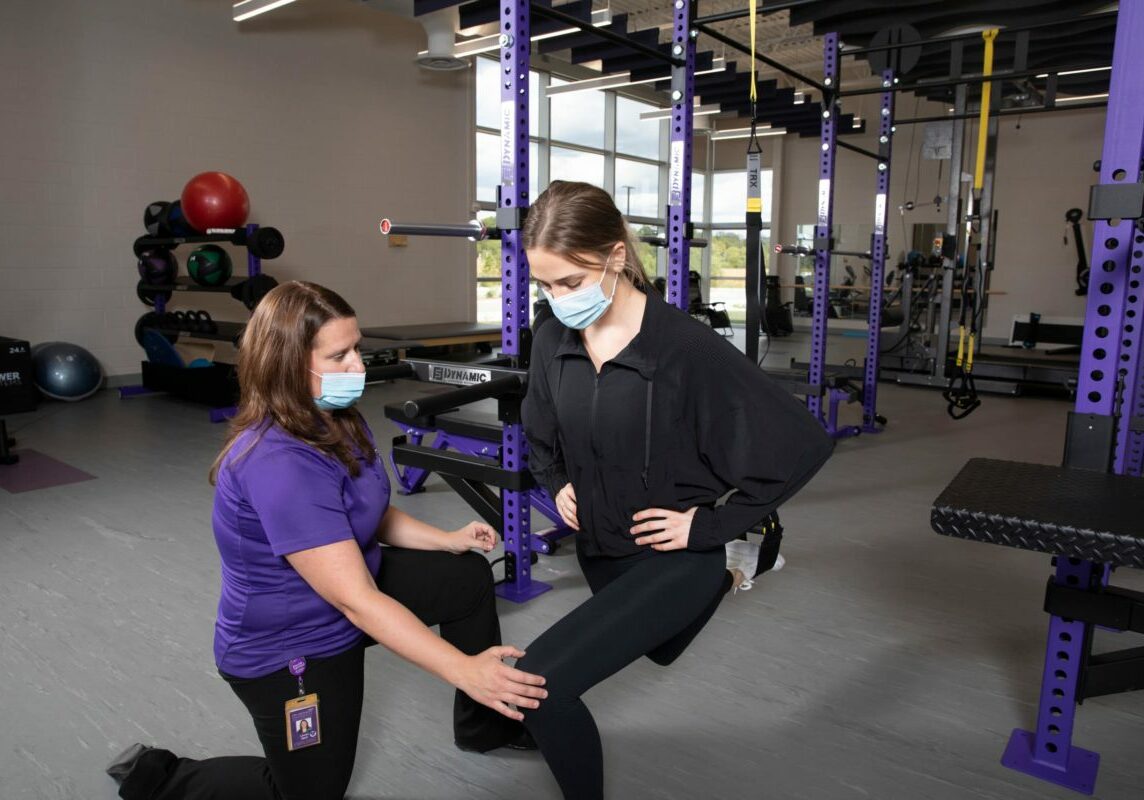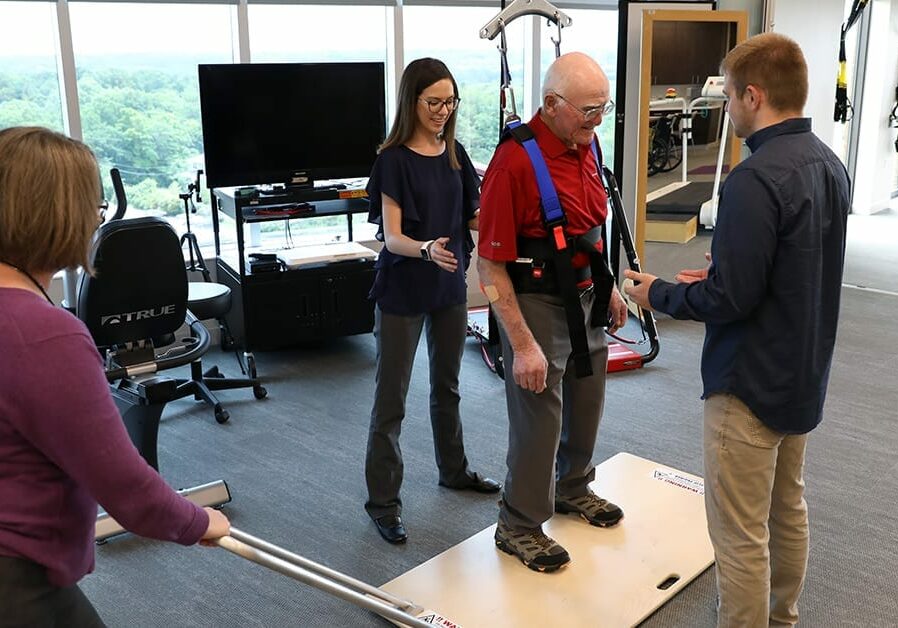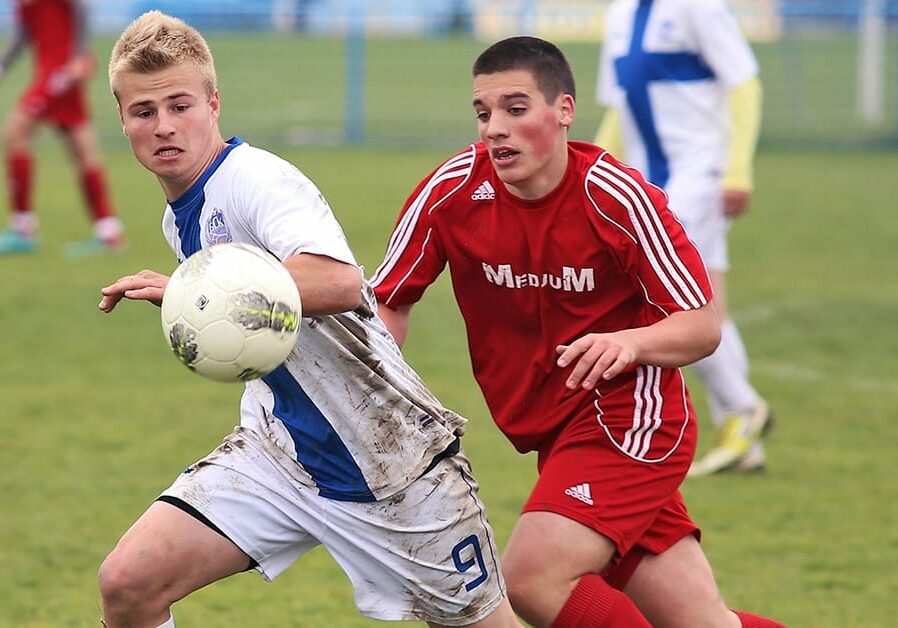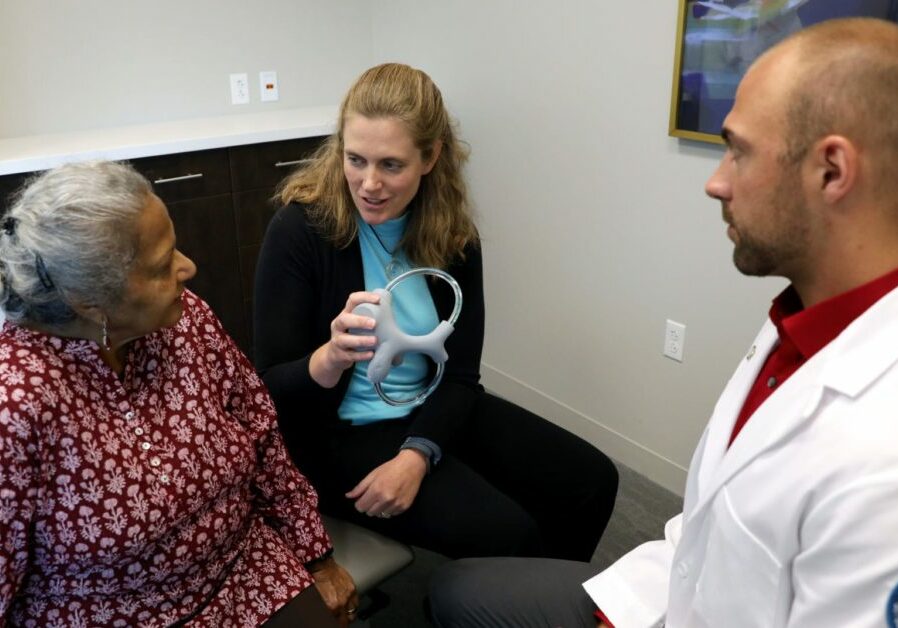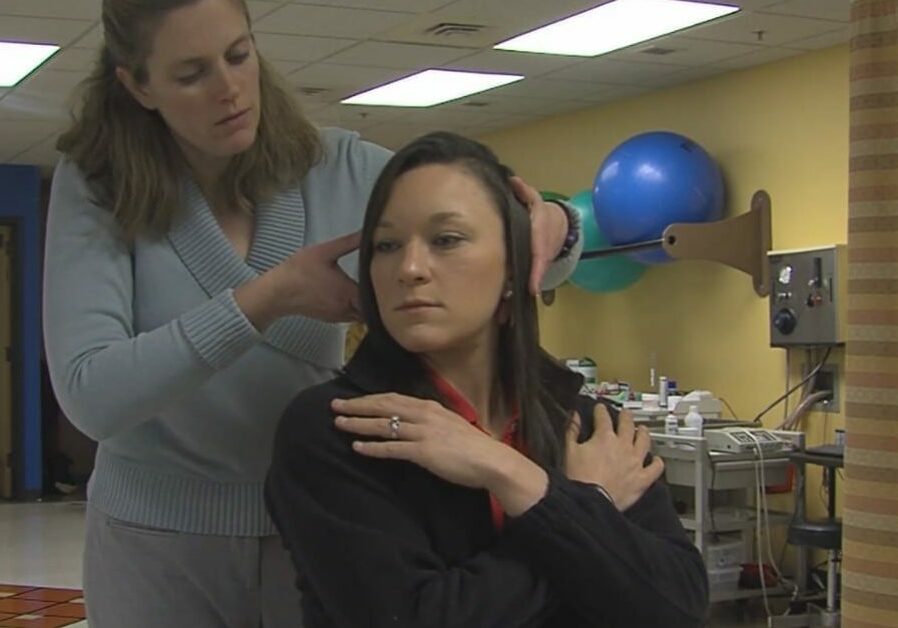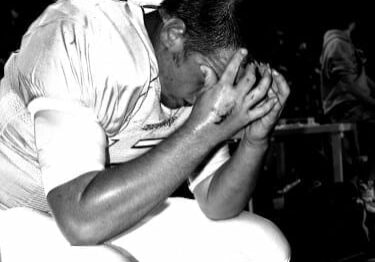Concussion evaluation and management
Concussions are a serious problem that often go unrecognized. They can happen at any age and at anytime due to sports, motor vehicle accidents, falls, riding a bicycle, sledding, etc. At Des Moines University, we understand each concussion is different. During your evaluation we combine objective data with the latest research to provide our patients with the best possible outcome!
What is a concussion?
Concussions are defined as a mild traumatic brain injury, usually caused by a direct hit to the head or an indirect blow to the body. This movement causes the head and brain to move around creating disruptions to the brain cells and nerves. Contrary to what you might think, concussions are not skull fractures or brain bleeds. The injury creates chemical changes in the brain that can lead to a wide variety of signs and symptoms.
Concussion symptoms and signs
It’s important to know that not everyone will experience every symptom. Everyone’s concussion is different; no two concussions are alike. Due to energy changes occurring in your brain, some symptoms occur immediately but other symptoms may take several days to begin.
- Dizziness
- Problems with balance
- Nausea and/or vomiting
- Balance problems
- Sensitivity to light
- Sensitivity to noise
- Blurred vision
- Headache
- Low energy levels
- Unequal pupils
- Seeing flashing lights
- Sleeping more than usual
- Unable to fall asleep
- Sleeping less than usual
- Difficulty remembering
- Confusion
- Inability to concentrate
- Inability to think clearly
- Mental fogginess
- Inability to remember new information
- Trouble paying attention
- Loss of focus
- Easily angered or upset
- Feeling nervous or anxious
- Feeling sadness
- Crying more than usual
- Lack of interest in usual activities
- Depression
What should you do if you suspect a concussion?
If you suspect an athlete, a child, or an adult has a concussion, remove them from the activity or sport. Get evaluated by a trained health care professional. Do not try to judge the severity of a concussion on your own.
When should you go to the emergency room?
Complications from concussion are rare but are possible. Call 9-1-1 right away or take the concussed individual to the emergency room if he or she experiences one or more of the following:
- One pupil larger than the other
- Drowsiness or inability to wake up
- A headache that get worse and does not go away
- Slurred speech, weakness, numbness, or decreased coordination
- Repeated vomiting, convulsions, or seizures
- Loss of consciousness (even if brief).
- If a child cannot be consoled
- Will not nurse or eat
Concussion treatment and recovery
Once you have been diagnosed with a concussion, begin your recovery journey as soon as possible. Our physical therapist and athletic trainers can help! They are highly trained to provide the most up to date scientific research on concussion management which may include vestibular therapy, headache therapy, balance training, manual therapy, and more!
Here are a few tips to get you started:
- Relative rest is the recommended course of treatment. Avoid strenuous activity such as weight lighting, PE, sporting events, endurance activities.
- Limit video games, text messaging, social media, and computer screen time (do not eliminate)
- Limit reading and homework (do not eliminate)
- Avoid driving until cleared by a medical professional.
- Avoid over the counter medication (Advil, Motrin, Aleve, ibuprofen), unless otherwise directed by a physician.
- It is okay to use ice packs on the head/neck for comfort.
- It is okay to allow the concussed individual to sleep.
It takes a team to manage concussions, and every member is important! Alert your school team or work team (coaches, teachers, etc) and family team (parents/legal guardian). Follow up with your medical team (physicians, athletic trainers, physical therapist and others who specialize in concussion management).
Every concussion is different. If managed appropriately, most people return to the activities they love with in 2 -4 weeks.
| Appointments | 515-271-1717 |
|---|---|
| Hours | Monday - Friday from 7 a.m. to 5 p.m. |
| Location | 3200 Grand Avenue, Des Moines, IA 50312 |
DMU physical therapy providers serve with expertise and an entrepreneurial spirit
On a given day, Lauren Mach, P.T., D.P.T., ATC, CCVT, might be working with a member of the Iowa Phoenix, the state’s only female tackle football team, or a Wombat, a member of a Des Moines men’s rugby team. She […]
Falls and Concussions in Older Adults
“Help, I’ve fallen and can’t get up.” Many of us have heard this catchphrase from the Life-Alert commercials, but for some older adults these commercials touch on a very real fear: falling. Falls are the leading cause of fatal and […]
Returning to Physical Activity After a Concussion
While concussions are often considered a sports injury, they can occur any time a force acts upon the head. Avoiding physical or mental exertion has historically been the prescribed treatment plan for individuals recovering from a concussion, but research has shown […]
7 Concussion Myths and Misconceptions
This article was co-authored by Des Moines University students Brittney England, D.P.T.’21 and Jordan Wachter, D.P.T.’21. Concussions are a hot topic in our society that affects children, athletes, and adults of all ages. Understanding the best care and treatment is […]
Concussions: What do parents need to know?
Concussions are defined as a traumatic brain injury usually caused by a blow to the head, whiplash, or an abrupt stop of the head. What is a concussion? Contrary to what you may have heard, concussions are not “brain bleeds.” […]
Is a vestibular disorder making your head spin? DMU Physical Therapy Clinic can help
Do you suffer from dizziness, vertigo, lightheadedness or imbalance? Is it affecting your quality of life? You may be among the estimated 69 million Americans ages 40 and older who have vestibular disorders, which also can affect people of any […]
Exercise your inner ears to alleviate vertigo and balance issues
Your ears play a major role in balance and movement. The organs in your inner ear make up the vestibular system and sense the position of your head in space. The vestibular system works together with your vision and somatosensory […]
Spotting the signs of a concussion
Back to school time means back to sports for kids of all ages. Participating in a sport always brings a risk of injury, none more serious than head injuries. A serious blow to the head can shake the brain around […]

